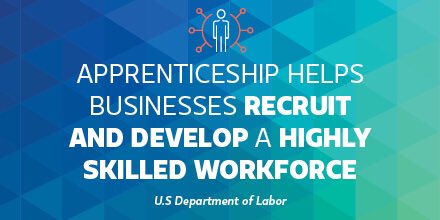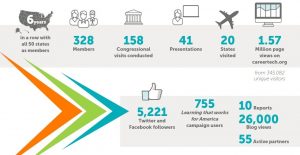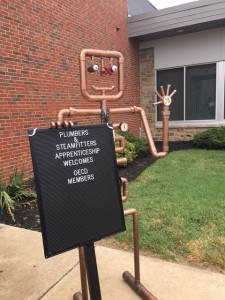NASDCTEc is pleased to welcome new staff member, Kate Blosveren Kreamer, who serves as the Associate Executive Director of the National Association of State Directors of Career Technical Education Consortium (NASDCTEc), leading policy and communications efforts to ensure all students have access to high-quality career technical education.
From 2006 to 2013, Kate worked at Achieve, beginning as a policy analyst and leaving the associate director of strategic initiatives, leading a range of policy, research, and communications projects to support states’ adoption and implementation of the college- and career-ready agenda.
Prior to her time at Achieve, Kate was a policy advisor at Third Way, where she acted as a policy liaison between the organization and its Corporate Leadership Committee, engaging on a very broad legislative agenda. Kate also spent a year as a research assistant at the Progressive Policy Institute, focusing exclusively on education policy issues.
Kate serves as the co-founder and President of Young Education Professionals-DC (YEP-DC), a nonpartisan organization, created by and for young professionals that connects tomorrow’s education leaders around the common goal of improving education through policy, research, and practice. Kate also helped co-found and acts as a strategic advisor to YEP National, the umbrella organization that supports the now eight YEP chapters across the country.
An Orange, Connecticut native, Kate received her bachelor’s degree in Urban and Regional Studies from Cornell University, and her master’s of public policy from the Georgetown Public Policy Institute in 2006, with a concentration in Education, Family, and Social Policy.
In addition to serving as an organizational spokesperson, Kate’s other responsibilities include:
- Supporting states’ adoption and implementation of the CCTC and the related policies/programs, through the development of relevant research, policy guidance and other tools/resources
- Overseeing the organization’s communications strategy, including the expansion of the CTE: Learning that works for America® campaign
When asked for her goals in her position, Kate said she wants to help ensure CTE is a full partner and component of the broader college- and career-ready agenda currently underway in most states; to raise the visibility of CTE as the most effective strategy in graduating all students and preparing them for life after high school; to develop and maintain strong partnerships with key national and state-based organizations; and to help ensure even stronger support and engagement from business/industry around CTE.
Please extend a warm welcome to Kate. She can be reached at kblosveren@careertech.org or 301-588-9630.
Ramona Schescke, Member Services Manager


 (CTE) program of study, enhance the educational experience and better prepare learners for future career success. In June 2017, Advance CTE,
(CTE) program of study, enhance the educational experience and better prepare learners for future career success. In June 2017, Advance CTE, 

 Probably the most fun part of the event was the afternoon dedicated to visiting WBL in action at programs throughout Baltimore. I had the chance to visit
Probably the most fun part of the event was the afternoon dedicated to visiting WBL in action at programs throughout Baltimore. I had the chance to visit 